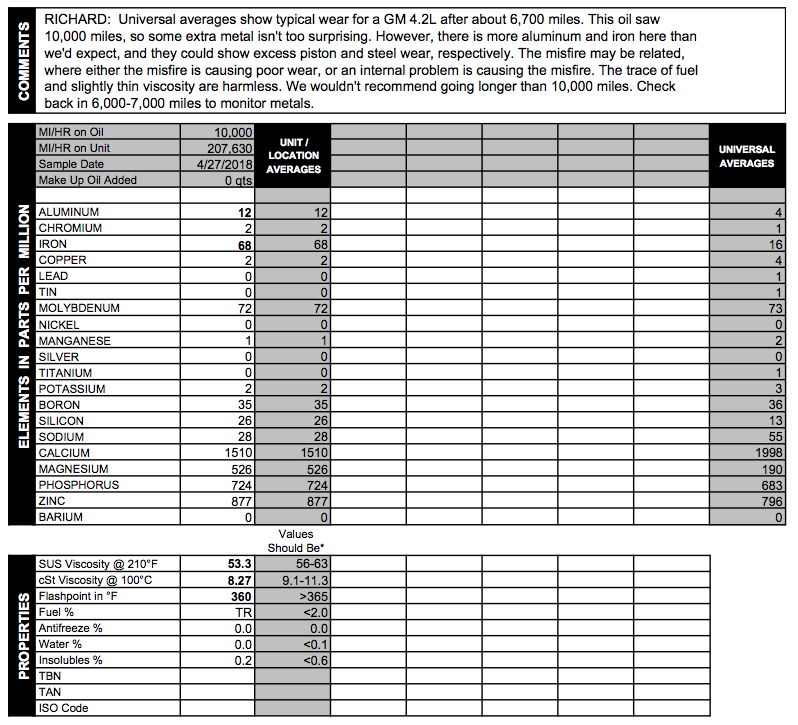 May 19th was National Oil Change Day and we here at Moron Reviews decided to roll up our sleeves and get our hands dirty by exploring the world of motor oil. For our experiment, we tackled two topics: is synthetic motor oil better than conventional oil? Is having your oil analyzed worth it? Before we dive into our analysis, let’s address some common myths and facts about motor oil:
May 19th was National Oil Change Day and we here at Moron Reviews decided to roll up our sleeves and get our hands dirty by exploring the world of motor oil. For our experiment, we tackled two topics: is synthetic motor oil better than conventional oil? Is having your oil analyzed worth it? Before we dive into our analysis, let’s address some common myths and facts about motor oil:
One of the biggest debates about motor oil is whether you should change it every 3,000 miles. Many people have been going by the “change your motor oil every 3,000 miles” rule for sometime. The fact is that unless you have an internal problem with your engine – 3,000 is miles is just a waste of money and oil. If your vehicle is leaking or burning oil – then the 3,000 mile interval change is fine for those using non-synthetic motor oil.
For our experiment, we switched out the oil in a 199,000 mile engine that had strictly run conventional oil its entire life and put in Mobile 1 High Mileage 5 W 30. Seeing that many engines don’t make it this far, we were interested to see what an oil analysis would show for an engine with 208,000 miles (running 9,000 miles of synthetic). We documented the whole process and made into a video for anyone curious about how to change their own oil or getting their oil analyzed. You can watch the video below:
The other debate is whether synthetic oil is really worth the price compared to conventional motor oil. Some may boast about the benefits of using synthetic motor oil, but the main benefit is that synthetic doesn’t break down as quickly as conventional (dino) oil, thus increasing its longevity. The longevity justifies the heavier price tag of synthetic oil over conventional. Synthetic may cost twice as much, but it can last three times as long as conventional oil. In some cases, conventional oil may not even be an option as engines have evolved in recent years and strictly require synthetic oil.
Another benefit of synthetic oil is that it contains more cleaning detergents than conventional oil and will actually clean your engine while using it. Many mechanics do not recommend switching to synthetic in higher mileage engines (125,000 +) that have strictly run conventional oil as the engine may develop oil leaks from the synthetic oil cleaning out the “gunk” from the previous motor oil. This “gunk” may have kept potential leaks “plugged” and prevented actual oil from leaking. The belief is that the engine has built up gunk in its seals and that gunk is keeping the oil from leaking. When you introduce synthetic motor to an old engine – it breaks down the gunk due to the higher level of cleaning detergents in synthetic as opposed to conventional. This is why many people will develop oil leaks after switching to synthetic. This is opinion and not fact, as the vehicle we tested on strictly ran conventional oil for its entire life (199,000 miles) and we experienced zero leaks after running synthetic oil for 9,000 miles.
Many also state that synthetic oil has a different viscosity than conventional oil and that the molecules are actually smaller than conventional oil hence why your engine might not leak with conventional oil, but will leak with the synthetic. Because synthetic oil is known to keep its thinner viscosity in colder climates, as opposed to conventional oil, it is better for engine startups in cold climates. Another myth we would like to debunk is that the “W” in motor oil stands for “weight”. The “W” actually stands for “winter”.
As stated above, we tackled a mid-size SUV with 199,000 miles on its original engine. The 4.2 I6(inline) engine had a permanent misfire on cylinder three so we were interested in seeing the results. Contrary to popular belief, an engine can run for a very long time on a misfire, but it will affect your mileage, acceleration, idle and make your car sound like John Candy’s vehicle in “Uncle Buck” upon startup.
The engine did not leak once in the following 9,000 miles driven while running synthetic oil. This was probably due to the fact that the conventional oil had been changed promptly every 3,000 miles for the duration of the engine’s life. We noticed that after replacing the oil and cleaning the throttle body – the engine did run rougher than prior to the oil change, but this is mostly likely to the throttle body and the PCM relearning the idle.
Oil Analysis used to be something only motor oil company’s boasted about to publicize the performance of their own motor oil. If you remember the old Mobil 1 commercials, they bragged that an engine running Mobile 1 showed no wear after running 100,000 miles. There’s also this strange commercial with an Englishmen frying motor oils in a pan for comparison. I don’t know about you, but I don’t think I’ve ever taken mechanical advice from a man with an English accent.
So, do you really need to change your oil every 3,000 miles? The short answer: no. As technology has advanced you will notice that engines are in fact getting smaller in cubic inches while generating the same, if not more, power than their predecessors. There is one noticeable difference – they all require full or blended synthetic oil.
What’s the difference between dino and oil and synthetic? Well, Dino oil is all natural and just like it states – it is compromised of 100% organic, the same that is diluted and used for gasoline. Synthetic however is artificially created and does not use real oil. It is one of the rare cases where synthetic is actually better (and costs more) than the real thing it is imitating.
Why is synthetic better? The short answer: it takes longer to break down than conventional oil. By breaking down, we mean “gunking up” or “getting darker in color”. So, if dino oil costs half the price of synthetic oil, but you replace it thee times as often – you’re better off using the synthetic blend and saving money.
We wanted to see how badly worn this engine was that had been running dino oil for 199,000 miles. Many experts warn people from switching from dino oil to synthetic in a vehicle that is over 100,000 miles. The reason is viscosity. Viscosity is the “thickness” or “thinness” of a liquid. So think of maple syrup as being a thick viscosity while conventional water would be of thin viscosity.
Dino oil is actually thicker viscosity than synthetic oil – even when it is the same weight. Because synthetic is a thinner viscosity it also runs better in cold winters because it doesn’t get thick like conventional oil does by being effected from the cold temperature. Think of maple syrup that’s been in a refrigerator at 45 degrees and how slowly it oozes out of the bottle. Now think of the same syrup that’s been outside in 70 degree heat and runs much thinner out of the bottle.
We mailed our oil through USPS on May 1st, 2018 and received our test results via email on May 15th, 2018. It took exactly 2 weeks from the day of shipping the sample for us to obtain the results. So, what were the oil analysis results of an engine that has been running dino oil for 198,000 miles that just switched to synthetic for the last 9,000?
Below is the report from Blackstone:

The high level of iron shows that there is high piston wear during the 9,000 miles this oil was used. The report actually surprised us as we expected higher amounts of fuel to be found in oil (due to the misfire) and possible coolant from such a high mileage engine.
So, in conclusion – is synthetic motor oil better than conventional oil? Yes. Is the Blackstone oil analysis worth it? Short answer: Yes. If you’re buying a used car and the owner is nice enough to let you sample some of the oil for analysis before buying it. Problem is, the car very well may be sold in the two weeks it takes you to get the analysis back.
Personally, it would be more helpful if Blackstone offered a more detailed, written explanation of what else to lookout for. You can pay an additional $10 to see the results of your additives, but seeing that this report does not recommend we go past 10,000 miles for the oil change – it kind of answers that question anyways.
If you’re running conventional oil (with no engine problems) you should change the oil roughly every 5,000 miles. Make sure you are not burning or losing oil as that will affect your oil change interval. If you’re running synthetic you should change it every 7,000 – 10,000. And “yes” you should change your oil filter every time you change your oil.





